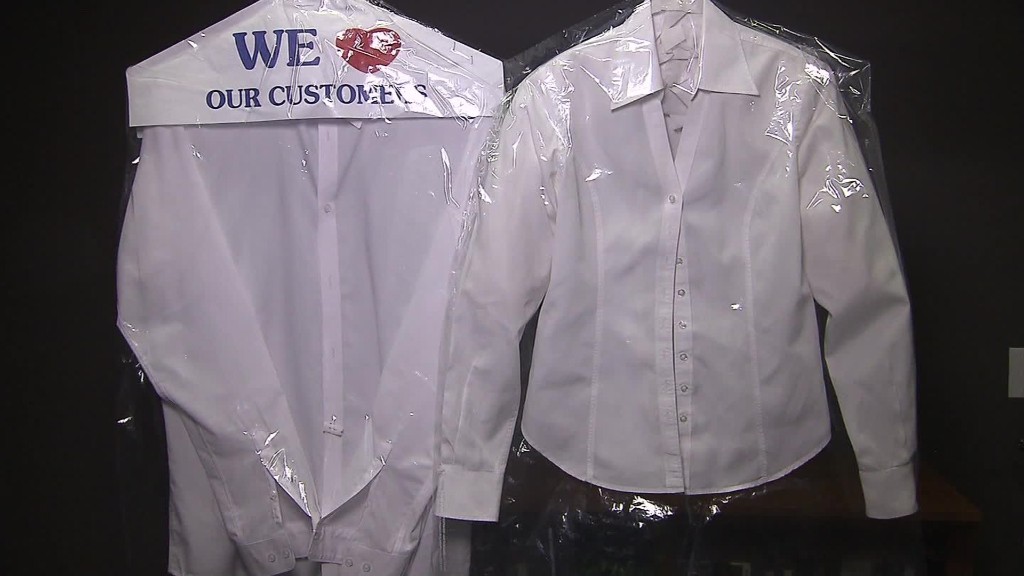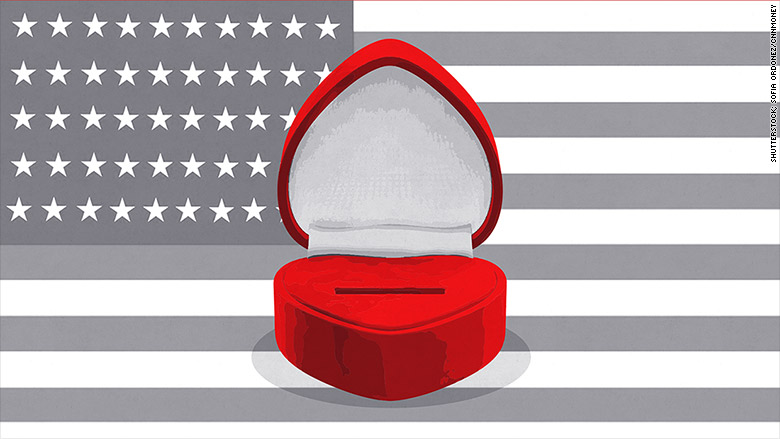
The 2016 election could come down to the single ladies.
That's the warning to Hillary Clinton, Donald Trump and the rest of the field from Rebecca Traister, author of a new book titled "All the Single Ladies" that's getting a lot of buzz.
Candidates can't ignore that the power of the single ladies bloc is growing -- 53% of adult American women are now single. Democrats count on the support of unmarried women to win.
Many voters are upset with the status quo this year, but single women have an especially long list of reasons to be mad. Simply being born female in the United States means you'll probably earn less than your male peers and pay more for life's basic necessities.
Traister argues that this is "a revolution," yet the U.S. government and many businesses are still operating with a 1960s mentality.
Here are 10 ways unmarried women get crushed financially.
Related: America's cheap labor: Women
1. You get paid less than men
American women get less money than men. Females earn 84 cents for every dollar a male does, according to Pew Research. PayScale says the gender gap is even worse: women make only 77 cents for every dollar that men do.
Some of the gap is explained by the fact that more women work in lower paid jobs such as administrative assistant and social work. But the gap exists even when women and men have the same jobs and qualifications.
For the exact same work, women earn only 97 cents for every $1 that their male peers do, according to an extensive PayScale study. The bottom line is women, especially single women, are living on less.
2. You typically pay more for shampoo
Women face a double whammy financially: they get paid less but they often have to pay more for basic items like shampoo, razors and jeans. The phenomenon has been dubbed the "pink tax."
A recent study by the New York City Department of Consumer Affairs found that haircare products for women cost on average 48% more than the same items marketed to men.
Related: Women sue to block New York's 'Tampon Tax'
3. Singles pay more for car insurance
Not being married is a major strike when it comes to getting car insurance, especially in your 20s. Both unmarried men and unmarried women pay higher premiums than their friends who have tied the knot, according to InsuranceQuotes.com.
Some question whether insurers need to re-do their calculations, especially now that the median age that women marry has jumped from 22 in 1980 to over 27 now. Hawaii is the only state that prohibits insurance companies from considering marital status in rate calculations.
4. You are far less likely to be a CEO
Whether you call it a glass ceiling or a pink ghetto, the reality is there aren't many American women who make it to the top. PayScale found that the wage gap gets worse the higher up the career ladder women go. No wonder there are fewer female millionaires and billionaires.
Only 24 CEOs at America's 500 biggest publicly traded companies are female. And the pipeline behind them isn't encouraging. At large corporations, only 16.5% of the top five positions are held by women, according to a CNNMoney analysis last year.
To change this, "we need both 'Lean In' and structural change," says Sallie Krawcheck, once the top woman on Wall Street. Now she's launching Ellevest, an investment startup serving women.
CNNMoney wants to know: Have you gotten a raise?
5. Don't expect paid time off when you have a baby
About 40% of American babies are born to unmarried women. Being the mother of a newborn is tough, but it's even harder since the U.S. is the only developed nation that doesn't guarantee paid leave for new mothers.
America's Family and Medical Leave Act allows some workers to take up to 12 weeks of UNPAID leave following the birth of a child. However, less than 60% of workers are eligible for this, according to the Labor Department.
"Businesses save money when you have good paid leave. There are lower rates of turnover," says Victoria Budson, executive director of Harvard's Women and Public Policy Program.
6. You are more likely to earn the minimum wage
Two-thirds of minimum wage workers in the United States are women, according to the National Women's Law Center. In fact, half of minimum wage earners are single mothers. It's one of the reasons the poverty rate for women is higher than for men.
"A raise in the minimum wage would dramatically impact single women," says author Traister.
Related: 'Pink tax' angers women from New York to London
7. College debt takes a bigger bite out of your paycheck
While many applaud that women are earning more college degrees than men, the fact that female college grads typically make less money than their male counterparts is a problem when it comes to paying off student loans.
Women devote a much higher percentage of their income to their monthly student loan payments, according to studies by the Institute for Women's Policy Research and the American Association of University Women. That means less money left over for rent, health care and other expenses.
8. Childcare is expensive
Almost a quarter of America's children now live in a single-mother family. Single mothers are extremely likely to be low-income or living in poverty, according to government data.
A major reason is childcare. It's a huge expense for a single working woman to bear. In some states, childcare costs are now higher than tuition at the state university, according to Child Care Aware of America.
9. You don't get the startup funding that men do
Unmarried women are likely to have a job, but whether they have a typical company job or try to strike out on their own, they are at a disadvantage. Women receive a lot less "venture capital" to start companies than men do.
"It's not going to change anytime soon," says Krawcheck. The problem, she says, is men dominate the financial world and they are more likely to take a chance on someone who looks like them.
Related: Female investors often beat men
10. You might pay more for disability insurance
No one likes to think about disability insurance. You only need it when you get hurt on the job and can't work for awhile. But women should think more about it because they often get charged higher rates.
Insurers argue that they are right to charge women more because historically women have filed more disability claims. But there are growing calls to level the playing field -- much like the Affordable Care Act made it illegal to charge women more for health insurance.
If someone buys disability insurance through their company plan, it's gender neutral, meaning men and women pay the same rates. But if a woman buy disability insurance on her own, she'll have to pay the higher rate.
Related: Why Hillary Clinton could beat Donald Trump
The bottom line
The bottom line is women earn less than men, yet women have to pay more for many basic life expenses. Unmarried women are at an even greater disadvantage since they have to carry all the financial burden on their own -- and pay more for things like car insurance.
And this is before anyone even talks about the lingering stigma of being a single woman "of a certain age."
But change may come quickly.
"I think there's clearly political pressure that was not present before," says Budson at Harvard. "We have both men and women speaking out in politics and the entertainment industry and in day to day conversations about the wage gap."
Traister agrees. "Huge numbers of women are saying...We are a changed nation and we require a different relationship with our government."



